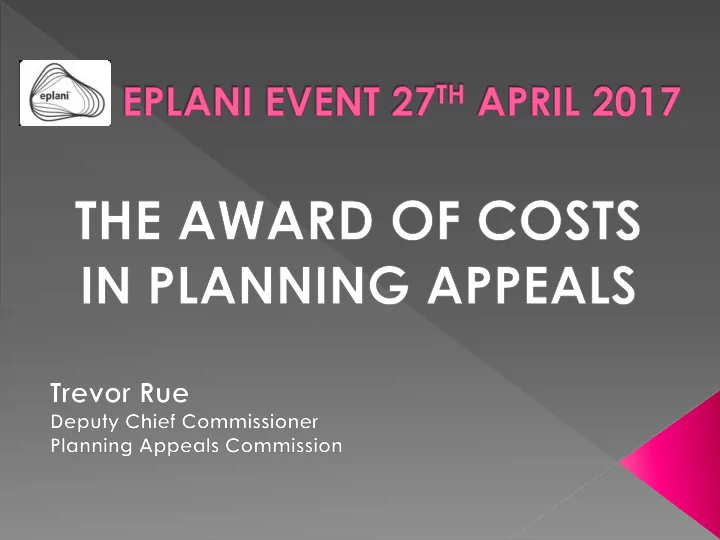

Summary of the Commission’s guidance on costs awards Data and commentary on costs decisions issued since inception of new system Lessons for all parties
Appeals against refusal of planning permission Appeals in default of a planning decision Listed building, conservation area and hazardous substances consent appeals Enforcement notice appeals Lawful development certificate appeals Appeals concerning reviews of mineral planning permissions (not yet in force)
Appeals under the 2011 Act not listed on previous slide, for example submission notice appeals Appeals against decisions made before April 2015 Appeals under subordinate legislation, for example advertisements and removal of protected trees Hear-and-report functions – examinations, public inquiries and hearings Functions under non-planning legislation, for example roads and environmental appeals Appeals to the Water Appeals Commission
Does not depend on appeal procedure – hearing, accompanied site visit, written representations Can be awarded where a hearing was arranged but does not take place We will award costs only where there is a claim
Awards may be made in favour of or against any party , including objectors or supporters A statutory consultee is not a separate party The Commission is not a party – we can’t reclaim our own costs
The 2011 Act doesn’t specify in what circumstances costs should be awarded Clues in Assembly debate and explanatory memo Intended to provide redress when one party has put another to unnecessary expense because of unreasonable behaviour Should encourage responsible behaviour
The appeal is within scope A party has made a timely claim The party claimed against has behaved unreasonably The unreasonable behaviour has caused the claiming party unnecessary or wasted expense See Paragraph 12 of the Commission’s guidance document
In written representations appeals, any claim must accompany the final written submission Claims arising from behaviour at an accompanied site visit must be submitted within five working days Where a hearing takes place, claims must be made as soon as practicable after the behaviour that triggered the claim Where an appeal is withdrawn or a hearing is cancelled, claims must be submitted within 10 working days of notification being sent
Disagreement is not inherently unreasonable Costs will not necessarily follow the appeal result Where all parties have behaved reasonably, they can all expect to meet their own costs The ordinary, everyday meaning of reasonableness will be applied
Example 1 – causing an unnecessary appeal Example 2 – prolonging proceedings Example 3 – abandoning or not pursuing part of the case Example 4 – withdrawing or conceding an appeal But whether there has actually been unreasonable behaviour is always a matter of judgment Examples given above are not exhaustive
Employing an agent to submit the appeal Assembling background documents Employing someone to prepare written evidence and/or appear at a hearing Using the services of professional experts to advise, prepare written submissions and/or attend hearing
Expenses unrelated to the appeal Expenses incurred at application stage Indirect losses, such as those resulting from a delay in obtaining planning permission
Keep separate from statements of case and rebuttals and label clearly Provide all the information set out in Appendix 2 to the Commission’s guidance document Provide a full explanation of reasons for claiming Explain why the expenses being claimed were originally incurred
Claims submitted in writing will be copied to the party being claimed against That party will have 10 working days to respond (five where the claim arose from a site visit) If a claim is submitted during a hearing, the party claimed against may respond orally or may be allowed to do so in writing within 10 days
Separate from appeal decision but normally issued at the same time Factual disputes resolved on balance of probability Full award – claimant’s entire expenses from beginning to end of appeal process Partial award – where only some costs are claimed or where a claim for a full award is allowed in part Examples of partial awards – one issue, one person’s involvement, one part of appeal process No award – where any of the conditions set out in Paragraph 12 of the guidance are not met
Costs order will not specify a precise sum Amount can be agreed between the parties or referred to the Taxing Master in the High Court Costs orders can be enforced as a civil debt Costs orders are covered by our complaints process and susceptible to judicial review
By appellant against authority 26 By authority against appellant 17 By objectors against appellant 7 By objectors against authority 1 Against objectors 0 TOTAL CLAIMS CONSIDERED 51
Full award 2 Partial award 6 Denied 43 TOTAL DECISIONS 51 Overall success rate 16%
Ineligible 4 Out of time 3 No unreasonable behaviour 34 No unnecessary or wasted expenses 2 TOTAL CLAIMS DENIED 43
An authority withdrew a refusal reason in the course of an accompanied site visit. An authority changed its reasoning in support of a planning condition at statement of case stage. An appellant submitted an inaccurate land ownership certificate and, following an inconclusive hearing, withdrew the appeal. In three cases, appellants did not appear at proceedings they had requested, without giving prior warning of their non-attendance.
An authority refused permission on flood risk grounds, contrary to officers’ advice, even though the site was not in a flood plain and there was an extant permission for similar development. An appellant, having sought professional advice only after he lodged his appeal, then withdrew it, putting the authority to unnecessary expense on administrative and professional work.
Carefully assess at the outset whether you have a reasonable prospect of success. React in timely fashion to changing circumstances. Present credible evidence to support your case. Read the Commission’s guidance!
Recommend
More recommend